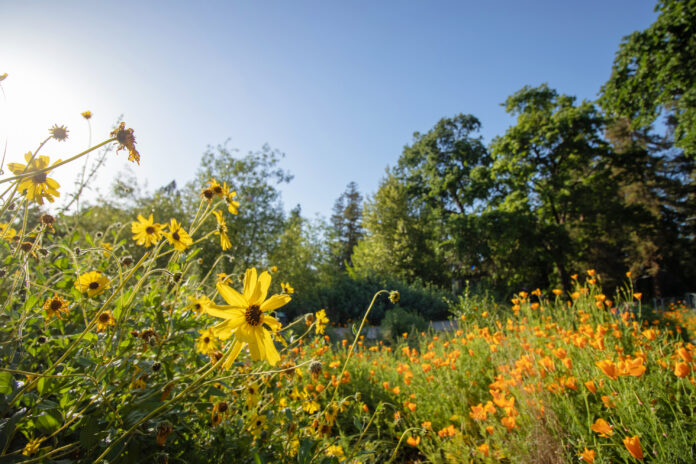A nonprofit student organization is taking environmental initiative to conserve California natural habitats
By LYNN CHEN — features@theaggie.org
Lea este artículo en español.
The Davis Rewilding Society, a nonprofit student organization founded in 2021, has the mission of introducing California native plants to the UC Davis campus as part of efforts to restore native habitats.
The club’s most recent project was taking part in the iNaturalist City Nature Challenge during the last weekend of April. The competition challenges cities around the world to upload as many observations of natural plants and animals as possible, all within a certain window of time. For the challenge, the Davis Rewilding Society brought its members to the Jepson Prairie Preserve to make observations of wildlife. Additionally, the club hosted a “bioblitz” on campus, a localized version of the challenge.
In addition to participating in environmental contests, the nonprofit brings members on educational excursions off campus, such as visits to the Cosumnes River Preserve or Point Reyes, to learn about wildlife plants. It also provides education on native habitats and biodiversity to members.
“We want our club members to really learn about and appreciate […] California’s biodiversity, which is a world biodiversity hotspot,” said Kees Hood, a fourth-year evolution, ecology and biodiversity major.
At 7 p.m. on Mondays, the nonprofit often hosts informational meetings and invite local biologists or club members to speak about particular issues.
These meetings are both informative and of interest to Sindhu Bala, a third-year evolution, ecology and biodiversity major and member of the Davis Rewilding Society.
“I definitely learned a lot about the biomes here in California, especially those in and around Davis,” Bala said. “And I have learned about the structure and morphology of plants, which was interesting and useful to me.”
The Davis Rewilding Society also hosts signature hands-on planting events, the most recent large-scale one occurring at the native habitat gardens at Bowley Hall in January. The events usually draw 40 to 60 people at a time, as planting a new plot requires lots of help to move plants, distribute mulch, manage damaged soil and put in new flora. The next one is scheduled to occur in fall quarter at the California Raptor Center, just south of campus, according to Kyle Elshoff, a third-year evolution, ecology and biodiversity major and event coordinator for the Society.
Club members also do smaller volunteering events on weekends, like weed and prune existing plots.
“We focus a lot on California native plants when planting, and we also try to specifically plant plants that are native to the Central Valley or Davis area,” Elshoff said. “For the Bowley planting project, for example, we had blue-eyed grass, hummingbird sage and lacy phacelia.”
The club has also planted iconic California poppies, perennial yarrow and sunflower-like California goldfields.
“There’s certainly a huge environmental impact, in terms of the pollinators we see come to our sites,” Elshoff said. “But there’s also the environmental impact from trying to create a native habitat on campus.”
Hood said that the club has made environmental progress despite its small-scale operations.
“It can feel hopeless with all the environmental issues that we and the biosphere are facing right now,” Hood said. “Climate change, habitat loss, pesticides and pollution — all this stuff — it just feels like so much. And so one of the core messages of the club is that even though everything feels hopeless, each individual person can make a difference.”
A metaphor Hood uses is that each scattered wildflower seed may become a flower that feeds several bees, and each milkweed may become sustenance for generations of monarch caterpillars. Through planting native flora one at a time and spreading the message on habitat restoration, a lot can be accomplished.
“You’ve actively led to more of a particular wildlife being able to live somewhere,” Hood said. “You’ve provided habitat for them directly. It’s just little things like that. They aren’t world-changing, […] but just those little actions — when lots of people do them — have such an incredible impact.”
The nonprofit also focuses on creating an inclusive atmosphere for both club members and non-members, as its plots of native plants bring together the campus community through a shared sense of nature appreciation.
“I’ve also noticed that we have an impact on people who don’t even know about us,” Elshoff said. “They see the plantings we’ve done that are filled with beautiful flowers, and I see them taking photos and getting up close, looking at the flowers and smelling them. That makes me really happy to see that people connect to some of the gardens that we’ve made.”
Written by: Lynn Chen — features@theaggie.org








